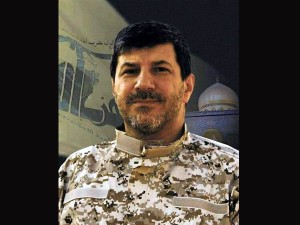Hezbollah commander killed outside home in Lebanon

Hassan al-Laqis was gunned down Wednesday outside his home in southern Beirut, security officials said. Hezbollah blamed Israel for the killing, something an official there quickly denied. AP
BEIRUT, Lebanon—A senior commander for the Lebanese militant group Hezbollah was gunned down Wednesday outside his home in southern Beirut, security officials said. The Iranian-backed group blamed its arch-enemy Israel for the killing, something officials there quickly denied.
Hezbollah immediately announced the death of Hassan al-Laqis and described him as one of the founding members of the group, suggesting he was a high-level commander close to the Shiite party’s leadership.
His shooting death comes as Lebanon faces increasing sectarian violence pouring over from the civil war in neighboring Syria, where Hezbollah forces fight alongside President Bashar Assad’s troops, angering the mainly Sunni rebels seeking to oust him. Hezbollah strongholds have been the target of car bomb attacks and suicide bombers attacked the Iranian Embassy in Beirut last month, killing 23 people.
Sunni militant groups have claimed responsibility for those attacks, calling it retaliation for Hezbollah’s involvement in Syria.
Hezbollah said in a statement al-Laqis was killed as he returned home from work around midnight.
Article continues after this advertisementA Lebanese security official and a Hezbollah official said assailants shot al-Laqis with a pistol equipped with a silencer at close range after he parked his car in the parking garage on the ground floor of the residential building where he lived in the Hadath neighborhood, some two miles southwest of Beirut.
Article continues after this advertisementHe was struck by five bullets in the head and neck, the Lebanese official said, speaking on condition of anonymity in line with regulations.
Footage from the scene broadcast on Hezbollah’s al-Manar television station showed the parking lot stained with muddied footprints that led to a nearby small olive grove. Yellow police tape blocked off the area.
Al-Laqis was rushed to a nearby hospital but died early Wednesday from his wounds, the officials said.
The Lebanese state news agency later published a photograph it identified as al-Laqis. The image showed a man who appeared to be in his mid-40s, with neatly cut black hair and a graying close-cropped beard, wearing beige-and-khaki military clothing.
The Hezbollah statement accused Israel of being responsible for the killing. It said Israel tried to kill him several times, but had failed.
“The Israeli enemy is naturally directly to blame,” the statement said. “This enemy must shoulder complete responsibility and repercussions for this ugly crime and its repeated targeting of leaders and cadres of the resistance.”
Israeli foreign ministry spokesman Yigal Palmor denied Israeli involvement.
“Israel has nothing to do with this incident,” Palmor said. “These automatic accusations are an innate reflex with Hezbollah. They don’t need evidence, they don’t need facts, they just blame anything on Israel.”
Yuval Steinitz, Israel’s minister of strategic affairs and intelligence, later told Israel Radio he wouldn’t comment on “rumors.”
“We are used to this habit that with almost everything there is a tendency first to blame Israel,” Steinitz said.
Hezbollah has fought several wars against Israel. Al-Laqis’ son died fighting Israel in the monthlong 2006 war. Israel’s spy service has been suspected of assassinating Hezbollah commanders for more than two decades.
In 1992, Israeli helicopter gunships ambushed the motorcade of Hezbollah leader Sheik Abbas Musawi, killing him, his wife, 5-year-old son and four bodyguards. Eight years earlier, Hezbollah leader Sheik Ragheb Harb was gunned down in south Lebanon.
But one of the biggest blows for the group came in 2008 when Imad Mughniyeh, a top Hezbollah military commander, was killed by a bomb that ripped through his car in Damascus.
Current Hezbollah leader Sheik Hassan Nasrallah has rarely appeared in public since the 2006 war. In a rare move, he traveled to neighboring Syria last week to meet the Syrian and Iranian presidents.
Hezbollah also has been fighting alongside Syrian President Bashar Assad’s forces in that country’s civil war, sparking attacks across neighboring Lebanon.
Al-Laqis’ killing came a half an hour after Nasrallah ended a three-hour interview with a local television station, in which he accused Saudi Arabia of being behind the Iranian Embassy bombings.
RELATED STORY: